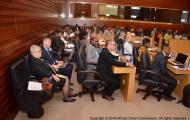Topic Resources
February 10, 2022
Agenda 2063 is Africa’s development blueprint to achieve inclusive and sustainable socio-economic development over a 50-year period.
January 01, 2025
Supply Chain Management Division Operations Support Services Directorate
Addis Ababa, Ethiopia
November 06, 2024
In a world where every click, every share, and every tweet can broadcast one’s thoughts to a global audience, the digital realm has becom
December 19, 2024






